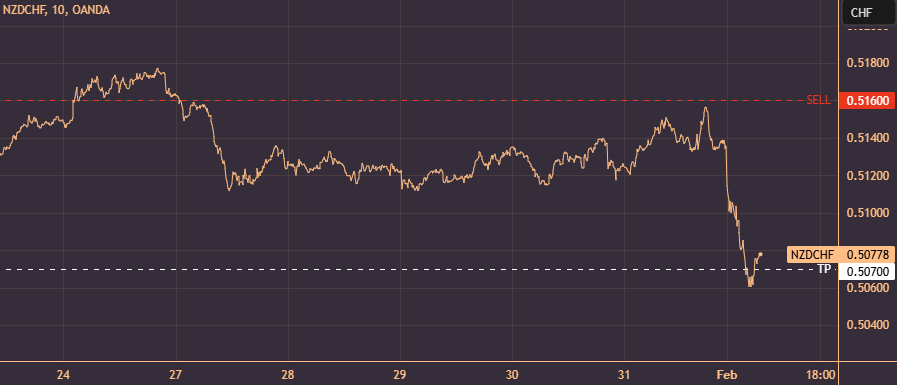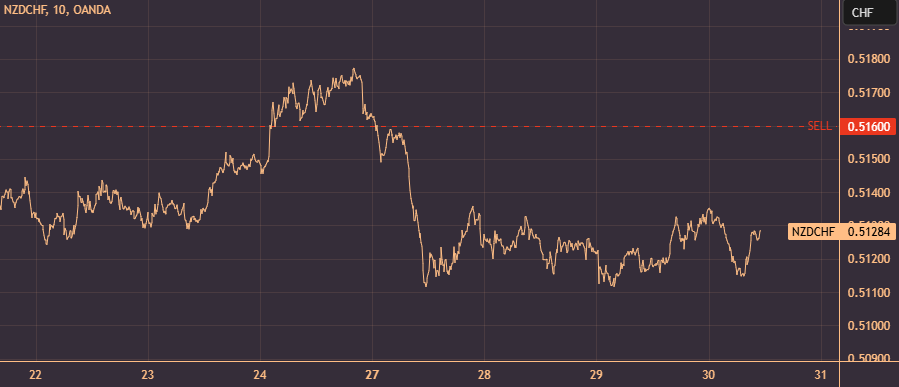Monday, February 3rd, 2025
The pair has fallen to the Take Profit during early hours trading on Monday.
Thursday, January 30th, 2025
The New Zealand dollar is sufficiently weak enough to keep this pair trending down but the Swiss franc may not be strong enough to move it much further. Under evaluation for an early exit.
Wednesday, January 22, 2025, Week 4
The New Zealand dollar and Swiss franc have both been influenced by global risk sentiment and central bank policies over recent weeks. The NZD weakened due to New Zealand's economic contraction and expectations of further RBNZ easing, while the CHF saw periods of strength amid safe-haven flows triggered by geopolitical events and US-China trade tensions. However, the SNB's rate cut and the potential for intervention limited the CHF's gains. These dynamics have created an interesting opportunity in the NZD/CHF cross, which we will explore in this trade plan.
Trading involves a possibility of losing money therefore all decisions in market speculation are undertaken at your own financial risk.
NZD/CHF: Very Weak and Very Bearish Outlook
The NZD/CHF cross has been influenced by diverging central bank policies and economic data. The NZD weakened significantly due to the confirmation of a technical recession in New Zealand and expectations of further aggressive easing by the RBNZ. Conversely, the CHF saw periods of strength amid safe-haven flows triggered by geopolitical events (political crisis in South Korea, collapse of the French government) and renewed US-China trade tensions. However, the SNB's surprise 50 bps rate cut in December and hints of further easing or intervention limited the CHF's gains.
On January 16th, 2025, the Business NZ PMI for December was released, showing a reading of 45.9, indicating continued contraction in the manufacturing sector, albeit at a slightly slower pace. This data reinforced the negative sentiment surrounding the NZD.
For the CHF, the procure.ch Manufacturing PMI for December was 48.4, slightly above expectations, while the unemployment rate for December rose to 2.8%. The inflation rate for December was 0.6%, in line with forecasts. The Swiss Market Index (SMI) demonstrated relative stability, reflecting the CHF's safe-haven appeal. Swiss bond yields declined, further supporting the CHF as investors sought safety.
The Commitment of Traders (COT) report as of January 14, 2025, showed mixed positioning in both NZD and CHF futures. For NZD, Dealers were net long, while Asset Managers and Leveraged Funds were net short. For CHF, Leveraged Funds increased their net short positions, Dealer Intermediaries slightly increased their long positions, and Asset Managers reduced their short positions. These mixed signals point to some uncertainty in the market.
Upcoming Economic Indicators
January 29, 2025:
NZ Balance of Trade (DEC). Forecast: NZ$-0.34B. A wider deficit could weaken NZD, while a narrower deficit might offer temporary support.
CH Balance of Trade (DEC). Forecast: CHF 1.7B. A larger surplus could moderately support CHF.
January 30, 2025:
NZ ANZ Business Confidence (JAN). Weaker confidence could further weigh on NZD.
CH KOF Leading Indicators (JAN). A positive reading would moderately support CHF.
January 31, 2025:
CH Retail Sales YoY (DEC). Forecast: 3%. Stronger-than-expected sales could moderately support CHF.
Trade Thesis
The NZD's fundamental weakness outweighs the CHF's safe-haven appeal, making a short position in NZD/CHF attractive. The confirmed recession in New Zealand, coupled with the RBNZ's aggressive easing bias, suggests further NZD depreciation. While the CHF might benefit from safe-haven demand, the SNB's dovish stance and intervention risk limit its upside potential. The upcoming economic indicators could further exacerbate the NZD's weakness. Weaker-than-expected New Zealand trade balance and business confidence data would reinforce the negative sentiment, while stronger Swiss data (trade balance, retail sales) might provide only modest support to the CHF.
Trade Plan: Selling NZD/CHF
Given the fundamental and technical backdrop, a short position in NZD/CHF is warranted.
Entry: Sell NZD/CHF at 0.516.
Stop-Loss: 0.536 (200 pips). This is placed to allow for some volatility.
Take-Profit: 0.507.
Conclusion: A High-Conviction Short Trade
This trade plan presents a high-conviction short opportunity in NZD/CHF. The NZD's fundamental weakness, driven by the recession and RBNZ easing, combined with the CHF's limited upside potential due to the SNB's dovish stance, creates a favorable risk/reward scenario. While safe-haven flows could temporarily support the CHF, the overall bias remains bearish for NZD/CHF. The upcoming economic indicators are likely to reinforce this bearish outlook, providing further catalysts for the trade.
Sources
Bloomberg, Reuters, Trading Economics, ForexLive, Financial Juice, Swiss National Bank (SNB), Reserve Bank of New Zealand (RBNZ), CFTC.




